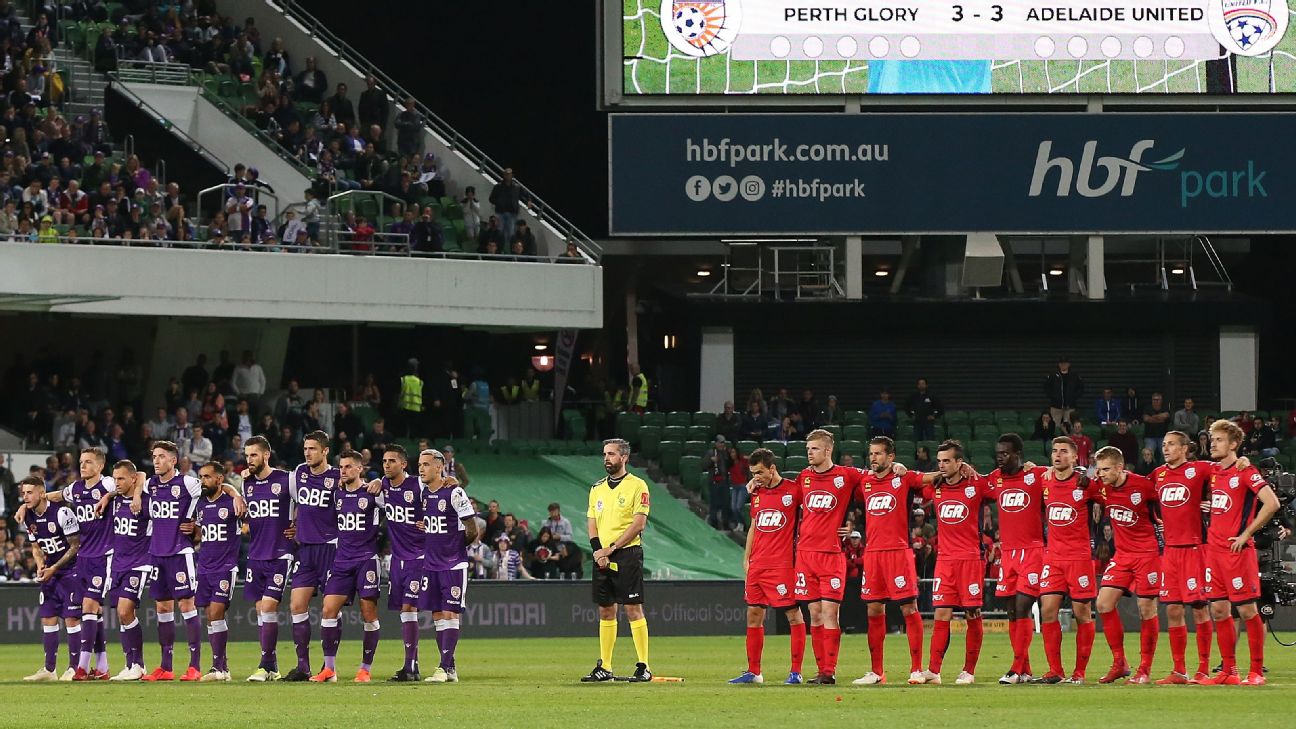



Goals change games. Football is unpredictable. Moments decide matches. Pithy is just as ubiquitous as permutability in football, but repeated usage doesn’t mean it is any less true.
The game’s fundamental volatility has been on show — both on the park and off, unfortunately — during this A-League finals series, and it will most likely be the same during this Sunday’s Grand Final.
Cause and effect is central to each game’s fluid narrative and as a footballing public, we tend to take for granted how perceivably small instances completely change them.
So, before Perth Glory host Sydney FC in Toilet Seat Bowl XIV, how did we get here? Which finals moments led us to this climax?
1. Mandi’s giveaway
David Williams‘ heavy touch and foul — leading to Georg Niedermeier’s 42nd minute goal — gave Melbourne Victory the ascendancy in their 3-1 elimination final win over the Wellington Phoenix a fortnight ago.
The goal allowed Kevin Muscat’s side to sit and react against the Phoenix, but the result was not beyond doubt. Mandi‘s error before Kosta Barbarouses‘ 53rd minute finish was the moment that really opened the game up.
– Former A-League star comes out as gay
– Krishna wins A-League best player award
– Poll: Who will win the A-League Grand Final?
Before that loss of possession in midfield, almost gifting the ball to Ola Toivonen, the game’s initial characteristics didn’t exactly change. Although more active, the Phoenix were still able to press Victory, in attempts to win the ball in advanced positions. At 2-0 however, the Phoenix needed to do much more in possession, which led to Sarpreet Singh’s introduction for the Spaniard.
The tempo of the game changed, and Roy Krishna’s goal injected further life into it, but Victory had the high ground in complexion. It was a scenario where Muscat’s side could simply capitalise on mistakes in Phoenix possession, which Toivonen did with awesome deftness.
2. De Laet’s shank
Paul Izzo should not go without recognition Adelaide United’s late 1-0 win over Melbourne City in the first week of the finals. His two fantastic full-stretch saves, denying Riley McGree and Shayon Harrison’s long range attempts, were absolutely necessary.
In a game of few legitimately crafted opportunities and very little in terms of risk, it seemed inevitable that if the two sides were to be separated, a mistake would create the gap.
Clear heads make the best decisions and in the 119th minute of extra-time, Ritchie de Laet’s looked more like a cloud of smog. His body positioning leads to a panicky attempt to clear, which leads to a rare opening for Craig Goodwin in transition.
Ben Halloran’s movement and calm finish to put Adelaide through to the semifinal reflected a fine season from a personal standpoint.
Collectively, though, that moment and game as a whole was just as indicative of the Reds dependence on the opposition in attack.
3. Konstandopoulos’ near miss
Exploiting the opposition’s phases of possession is still largely an effective ploy in the A-League, though. Perth Glory’s penalty shootout triumph over Adelaide in last Friday’s semifinal only provided further evidence.
Perth took the lead in the 30th minute through Diego Castro and a lovely team move, but Marco Kurz and Adelaide were comfortable sitting off the Glory, and the game could have taken a much different complexion had Adelaide capitalised early.
To that point, with the majority of possession, Perth’s three shots came through transitional phases and a dead ball, while Adelaide found joy in attempts to play quickly behind the hosts’ highly deployed three-man defence.
If there’s one thing Isaias excels at, it is pinging a diagonal into the path of willing runners, which then create potential opportunities for the ball to come back in centrally in transition. If Nathan Konstandopoulos even gets his foot on the ball to divert it into an open goal minutes before Castro’s opener, the semifinal would have unquestionably become a far different game.
Perth needing to come from a goal down — instead of the relief in complexion Castro’s goal provides, allowing them to react for the majority of the game — would have made for a fascinating watch.
4. Those penalties
If one thinks of every moment in a game of football being a fork in the road, a penalty shootout is like that head explosion scene in Scanners. Momentum can rapidly swing with each kick, amplifying the need for composure under significant mental pressure.
Penalties are a pure form of the game’s deceptive and changeable essence, from the penalty taker’s need to manipulate direction, body weight, timing and power, to the goalkeeper’s need to anticipate and act upon all these aspects within fractions of a second. After 120 minutes of energy expenditure, it can be torturous for some.
Five straight failures to convert can be interpreted in a number of ways, but Joel Chianese’s sudden-death penalty to send Perth into their second A-League Grand Final was a truly illustrative and captivating footballing moment.
5. Grant’s interception
Even going by the A-League’s levels of unpredictability and pragmatism, Sydney FC’s 6-1 demolition of Melbourne Victory on Sunday night is a standard bearer.
Last season, Lawrence Thomas was critical to Melbourne Victory’s finals triumph, coming up with crucial saves in each of their three games. On Sunday, one mistake changed everything.
Before that, however, came a vital interception from Rhyan Grant. It is impossible to say how the Victory would have realised that passage of play, but instead of a transitional opportunity with Sydney’s midfield assuredly behind play, Grant anticipates Raul Baena’s pass to Terry Antonis.
It creates the succession of corners which gives Sydney an early 1-0 lead. From there, Steve Corica’s side did not even pretend to want the ball in the first half, but they also nullified Victory’s attacking phases. All this, before Leigh Broxham’s own goal on the stroke of half-time effectively guaranteed Sydney’s place in Sunday’s Grand Final.
